8-orthoplex
| 8-orthoplex Octacross | |
|---|---|
 Orthogonal projection inside Petrie polygon | |
| Type | Regular 8-polytope |
| Family | orthoplex |
| Schläfli symbol | {36,4} {3,3,3,3,3,31,1} |
| Coxeter-Dynkin diagrams | |
| 7-faces | 256 {36} |
| 6-faces | 1024 {35} |
| 5-faces | 1792 {34} |
| 4-faces | 1792 {33} |
| Cells | 1120 {3,3} |
| Faces | 448 {3} |
| Edges | 112 |
| Vertices | 16 |
| Vertex figure | 7-orthoplex |
| Petrie polygon | hexadecagon |
| Coxeter groups | C8, [36,4] D8, [35,1,1] |
| Dual | 8-cube |
| Properties | convex |
In geometry, an 8-orthoplex or 8-cross polytope is a regular 8-polytope with 16 vertices, 112 edges, 448 triangle faces, 1120 tetrahedron cells, 1792 5-cells 4-faces, 1792 5-faces, 1024 6-faces, and 256 7-faces.
It has two constructive forms, the first being regular with Schläfli symbol {36,4}, and the second with alternately labeled (checkerboarded) facets, with Schläfli symbol {3,3,3,3,3,31,1} or Coxeter symbol 511.
It is a part of an infinite family of polytopes, called cross-polytopes or orthoplexes. The dual polytope is an 8-hypercube, or octeract.
Alternate names
- Octacross, derived from combining the family name cross polytope with oct for eight (dimensions) in Greek
- Diacosipentacontahexazetton as a 256-facetted 8-polytope (polyzetton)
Construction
There are two Coxeter groups associated with the 8-cube, one regular, dual of the octeract with the C8 or [4,3,3,3,3,3,3] symmetry group, and a half symmetry with two copies of 7-simplex facets, alternating, with the D8 or [35,1,1] symmetry group.A lowest symmetry construction is based on a dual of an 8-orthotope, called an 8-fusil.
| Name | Coxeter diagram | Schläfli symbol | Symmetry | Order | Vertex figure |
|---|---|---|---|---|---|
| regular 8-orthoplex | {3,3,3,3,3,3,4} | [3,3,3,3,3,3,4] | 10321920 | ||
| Alternate 8-orthoplex | {3,3,3,3,3,31,1} | [3,3,3,3,3,31,1] | 5160960 | ||
| 8-fusil | 8{} | [27] | 256 |
Cartesian coordinates
Cartesian coordinates for the vertices of an 8-cube, centered at the origin are
- (±1,0,0,0,0,0,0,0), (0,±1,0,0,0,0,0,0), (0,0,±1,0,0,0,0,0), (0,0,0,±1,0,0,0,0),
- (0,0,0,0,±1,0,0,0), (0,0,0,0,0,±1,0,0), (0,0,0,0,0,0,0,±1), (0,0,0,0,0,0,0,±1)
Every vertex pair is connected by an edge, except opposites.
Images
| B8 | B7 | ||||
|---|---|---|---|---|---|
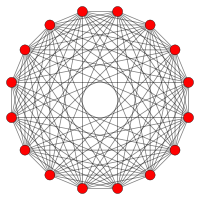 |
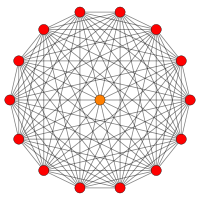 | ||||
| [16] | [14] | ||||
| B6 | B5 | ||||
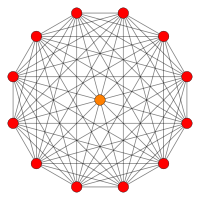 |
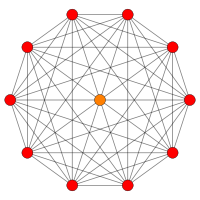 | ||||
| [12] | [10] | ||||
| B4 | B3 | B2 | |||
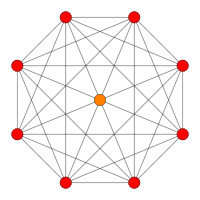 |
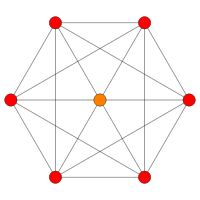 |
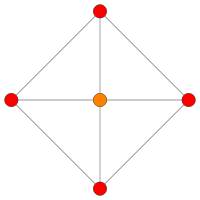 | |||
| [8] | [6] | [4] | |||
| A7 | A5 | A3 | |||
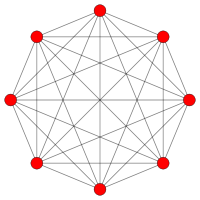 |
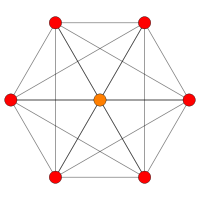 |
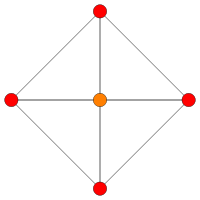 | |||
| [8] | [6] | [4] | |||
It is used in its alternated form 511 with the 8-simplex to form the 521 honeycomb.
References
- H.S.M. Coxeter:
- H.S.M. Coxeter, Regular Polytopes, 3rd Edition, Dover New York, 1973
- Kaleidoscopes: Selected Writings of H.S.M. Coxeter, edited by F. Arthur Sherk, Peter McMullen, Anthony C. Thompson, Asia Ivic Weiss, Wiley-Interscience Publication, 1995, ISBN 978-0-471-01003-6
- (Paper 22) H.S.M. Coxeter, Regular and Semi Regular Polytopes I, [Math. Zeit. 46 (1940) 380-407, MR 2,10]
- (Paper 23) H.S.M. Coxeter, Regular and Semi-Regular Polytopes II, [Math. Zeit. 188 (1985) 559-591]
- (Paper 24) H.S.M. Coxeter, Regular and Semi-Regular Polytopes III, [Math. Zeit. 200 (1988) 3-45]
- Norman Johnson Uniform Polytopes, Manuscript (1991)
- N.W. Johnson: The Theory of Uniform Polytopes and Honeycombs, Ph.D.
- Klitzing, Richard. "8D uniform polytopes (polyzetta) x3o3o3o3o3o3o4o - ek".
External links
- Olshevsky, George. "Cross polytope". Glossary for Hyperspace. Archived from the original on 4 February 2007.
- Polytopes of Various Dimensions
- Multi-dimensional Glossary
| Fundamental convex regular and uniform polytopes in dimensions 2–10 | ||||||||||||
|---|---|---|---|---|---|---|---|---|---|---|---|---|
| Family | An | Bn | I2(p) / Dn | E6 / E7 / E8 / E9 / E10 / F4 / G2 | Hn | |||||||
| Regular polygon | Triangle | Square | p-gon | Hexagon | Pentagon | |||||||
| Uniform polyhedron | Tetrahedron | Octahedron • Cube | Demicube | Dodecahedron • Icosahedron | ||||||||
| Uniform 4-polytope | 5-cell | 16-cell • Tesseract | Demitesseract | 24-cell | 120-cell • 600-cell | |||||||
| Uniform 5-polytope | 5-simplex | 5-orthoplex • 5-cube | 5-demicube | |||||||||
| Uniform 6-polytope | 6-simplex | 6-orthoplex • 6-cube | 6-demicube | 122 • 221 | ||||||||
| Uniform 7-polytope | 7-simplex | 7-orthoplex • 7-cube | 7-demicube | 132 • 231 • 321 | ||||||||
| Uniform 8-polytope | 8-simplex | 8-orthoplex • 8-cube | 8-demicube | 142 • 241 • 421 | ||||||||
| Uniform 9-polytope | 9-simplex | 9-orthoplex • 9-cube | 9-demicube | |||||||||
| Uniform 10-polytope | 10-simplex | 10-orthoplex • 10-cube | 10-demicube | |||||||||
| Uniform n-polytope | n-simplex | n-orthoplex • n-cube | n-demicube | 1k2 • 2k1 • k21 | n-pentagonal polytope | |||||||
| Topics: Polytope families • Regular polytope • List of regular polytopes and compounds | ||||||||||||